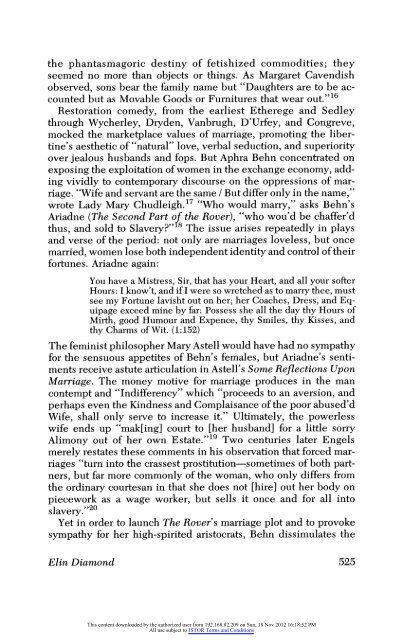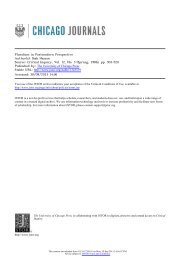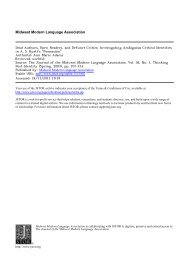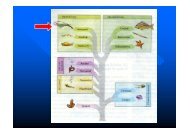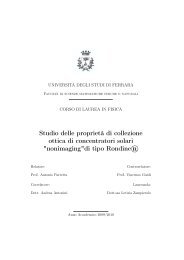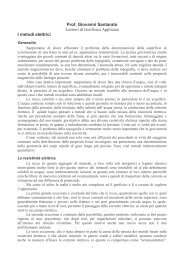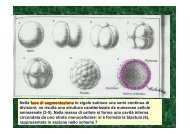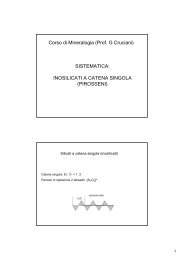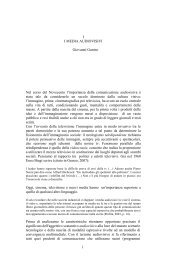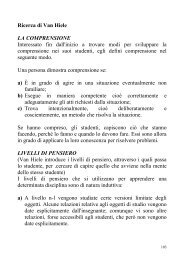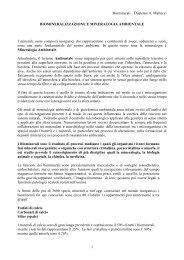Gestus and Signature in Aphra Behn's the Rover
Gestus and Signature in Aphra Behn's the Rover
Gestus and Signature in Aphra Behn's the Rover
You also want an ePaper? Increase the reach of your titles
YUMPU automatically turns print PDFs into web optimized ePapers that Google loves.
<strong>the</strong> phantasmagoric dest<strong>in</strong>y of fetishized commodities; <strong>the</strong>y<br />
seemed no more than objects or th<strong>in</strong>gs. As Margaret Cavendish<br />
observed, sons bear <strong>the</strong> family name but "Daughters are to be accounted<br />
but as Movable Goods or Furnitures that wear out."'16<br />
Restoration comedy, from <strong>the</strong> earliest E<strong>the</strong>rege <strong>and</strong> Sedley<br />
through Wycherley, Dryden, Vanbrugh, D'Urfey, <strong>and</strong> Congreve,<br />
mocked <strong>the</strong> marketplace values of marriage, promot<strong>in</strong>g <strong>the</strong> libert<strong>in</strong>e's<br />
aes<strong>the</strong>tic of "natural" love, verbal seduction, <strong>and</strong> superiority<br />
over jealous husb<strong>and</strong>s <strong>and</strong> fops. But <strong>Aphra</strong> Behn concentrated on<br />
expos<strong>in</strong>g <strong>the</strong> exploitation of women <strong>in</strong> <strong>the</strong> exchange economy, add<strong>in</strong>g<br />
vividly to contemporary discourse on <strong>the</strong> oppressions of marriage.<br />
"Wife <strong>and</strong> servant are <strong>the</strong> same / But differ only <strong>in</strong> <strong>the</strong> name,<br />
wrote Lady Mary Chudleigh." "Who would marry," asks <strong>Behn's</strong><br />
Ariadne (The Second Part of <strong>the</strong> <strong>Rover</strong>), "who wou'd be chaffer'd<br />
thus, <strong>and</strong> sold to Slavery?"'8 The issue arises repeatedly <strong>in</strong> plays<br />
<strong>and</strong> verse of <strong>the</strong> period: not only are marriages loveless, but once<br />
married, women lose both <strong>in</strong>dependent identity <strong>and</strong> control of <strong>the</strong>ir<br />
fortunes. Ariadne aga<strong>in</strong>:<br />
You have a Mistress, Sir, that has your Heart, <strong>and</strong> all your softer<br />
Hours: I know't, <strong>and</strong> if I were so wretched as to marry <strong>the</strong>e, must<br />
see my Fortune lavisht out on her; her Coaches, Dress, <strong>and</strong> Equipage<br />
exceed m<strong>in</strong>e by far: Possess she all <strong>the</strong> day thy Hours of<br />
Mirth, good Humour <strong>and</strong> Expence, thy Smiles, thy Kisses, <strong>and</strong><br />
thy Charms of Wit. (1:152)<br />
The fem<strong>in</strong>ist philosopher Mary Astell would have had no sympathy<br />
for <strong>the</strong> sensuous appetites of <strong>Behn's</strong> females, but Ariadne's sentiments<br />
receive astute articulation <strong>in</strong> Astell's Some Reflections Upon<br />
Marriage. The money motive for marriage produces <strong>in</strong> <strong>the</strong> man<br />
contempt <strong>and</strong> "Indifferency" which "proceeds to an aversion, <strong>and</strong><br />
perhaps even <strong>the</strong> K<strong>in</strong>dness <strong>and</strong> Complaisance of <strong>the</strong> poor abused'd<br />
Wife, shall only serve to <strong>in</strong>crease it." Ultimately, <strong>the</strong> powerless<br />
wife ends up "mak[<strong>in</strong>g] court to [her husb<strong>and</strong>] for a little sorry<br />
Alimony out of her own Estate."'9 Two centuries later Engels<br />
merely restates <strong>the</strong>se comments <strong>in</strong> his observation that forced marriages<br />
"turn <strong>in</strong>to <strong>the</strong> crassest prostitution-sometimes of both partners,<br />
but far more commonly of <strong>the</strong> woman, who only differs from<br />
<strong>the</strong> ord<strong>in</strong>ary courtesan <strong>in</strong> that she does not [hire] out her body on<br />
piecework as a wage worker, but sells it once <strong>and</strong> for all <strong>in</strong>to<br />
slavery.'20<br />
Yet <strong>in</strong> order to launch The <strong>Rover</strong>'s marriage plot <strong>and</strong> to provoke<br />
sympathy for her high-spirited aristocrats, Behn dissimulates <strong>the</strong><br />
El<strong>in</strong> Diamond 525<br />
This content downloaded by <strong>the</strong> authorized user from 192.168.82.209 on Sun, 18 Nov 2012 16:18:52 PM<br />
All use subject to JSTOR Terms <strong>and</strong> Conditions


